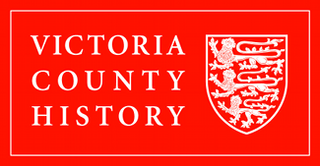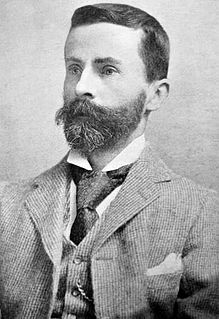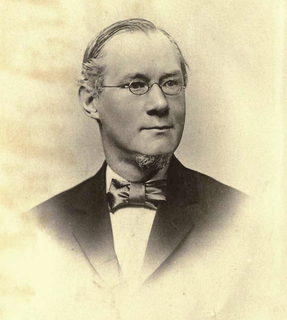
Andrew Lang was a Scottish poet, novelist, literary critic, and contributor to the field of anthropology. He is best known as a collector of folk and fairy tales. The Andrew Lang lectures at the University of St Andrews are named after him.

The Victoria History of the Counties of England, commonly known as the Victoria County History or the VCH, is an English history project which began in 1899 with the aim of creating an encyclopaedic history of each of the historic counties of England, and was dedicated to Queen Victoria. In 2012 the project was rededicated to Queen Elizabeth II in celebration of her Diamond Jubilee year. Since 1933 the project has been coordinated by the Institute of Historical Research in the University of London.

Richard Bowdler Sharpe was an English zoologist and ornithologist who worked as curator of the bird collection at the British Museum of natural history. In the course of his career he published several monographs on bird groups and produced a multi-volume catalogue of the specimens in the collection of the museum. He described many new species of bird and also has had species named in his honour by other ornithologists including Sharpe's longclaw and Sharpe's starling.

Francis Hindes Groome, son of Robert Hindes Groome, Archdeacon of Suffolk, was a writer and foremost commentator of his time on the Romani people, their language, life, history, customs, beliefs, and lore.

Sir Reginald Theodore Blomfield was a prolific British architect, garden designer and author of the Victorian and Edwardian period.

The Metropolitan Water Board was founded in 1903 to bring the nine private water companies supplying water to London under a single public body. The members of the board were nominated by the various local authorities within its area of supply. A Royal Commission had reported in 1899 on the need for such controls. The board was abolished in 1974 and control transferred to the Thames Water Authority, now Thames Water.

Sir James Balfour Paul was the Lord Lyon King of Arms, the officer responsible for heraldry in Scotland, from 1890 until the end of 1926.
The Zoologist was a monthly natural history magazine established in 1843 by Edward Newman and published in London. Newman acted as editor-in-chief until his death in 1876, when he was succeeded by James Edmund Harting (1876–1896) and William Lucas Distant (1897–1916).
The historic county of Middlesex in south east England was represented in Parliament from the 13th century. This article provides a list of constituencies constituting the Parliamentary representation from Middlesex.

George Washington Tryon Jr. was an American malacologist who worked at the Academy of Natural Sciences in Philadelphia.
Lieutenant-Colonel William Henry Clement Le Hardy was an English archivist.
Charles Henry Bourne Quennell (1872–1935), was an English architect, designer, illustrator and writer.
Rev. Peter Hempson Ditchfield, FSA (1854–1930) was a Church of England priest, an historian and a prolific author. He is notable for having co-edited three Berkshire volumes of the Victoria County History which were published between 1907 and 1924.
William Page was a prolific and pioneering historian and editor. For the last three decades of his life he was general editor of the Victoria County History.
William John Hardy was an English archivist and antiquarian.
Thomas Park (1759–1834) was an English antiquary and bibliographer, also known as a literary editor.
William Phillips was a Wales-born English botanist and antiquary.

Canon Oswald Pryor Wardell-Yerburgh, until 1889 known as Oswald Pryor Yerburgh, was a Church of England clergyman who held numerous offices.

This is a bibliography of the home counties of England that surround London. Generally included are Berkshire, Buckinghamshire, Essex, Hertfordshire, Kent, Surrey, and Sussex but others more distant from London—such as Bedfordshire, Cambridgeshire, Hampshire and Oxfordshire—are also sometimes regarded as home counties.











